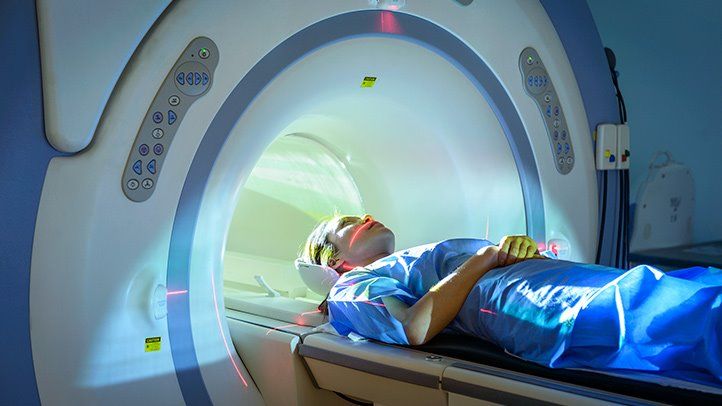The pancreas has two important components:
- The exocrine component is made up of ducts and small sacs at the ends of the ducts. These produce enzymes that help the body break down and digest food — especially fats — in the small intestine.
- The endocrine component is made up of clumps of cells located throughout the pancreas. These secrete hormones that play various roles in regulating the body's metabolism. One of the most critical of these hormones is insulin, which helps control glucose levels in the blood.
Signs and Symptoms of Pancreatic Cancer
- Chills and sweats
- Fever
- Bloating and gas
- Gastrointestinal discomfort or burning sensation in stomach
- Diarrhea or watery, loose, bad-smelling stools
- Nausea or vomiting
- Weakness or fatigue
- Fever
- Loss of appetite
- Unexplained weight loss
- Upper back or upper abdomen pain
- Swelling in an arm or leg
- Signs of jaundice, like yellowing skin and eyes and dark urine
Learn More About Signs and Symptoms of Pancreatic Cancer
How Is Pancreatic Cancer Diagnosed?
Noninvasive Imaging Tests To get a better look at the pancreas, your doctor may order tests such as an ultrasound, computerized tomography (CT) scans, magnetic resonance imaging (MRI), or positron emission tomography (PET) scans.


Cancer: What Tests Are Involved in the Diagnosis?
Endoscopic Ultrasound To see images of the pancreas taken from inside the abdomen, you may get an endoscopic ultrasound (EUS). This test involves inserting a thin, flexible tube into the mouth and through the digestive track all the way into the small intestine, close to the pancreas. A probe at the end of the endoscope uses sound waves to create an image of the pancreas that may reveal cancer.
Biopsy Your doctor may remove a small tissue sample to examine under a microscope. This is typically done during an endoscopic ultrasound, but can also be performed by inserting a needle through the skin and into the pancreas.
Blood Tests You may get blood tests to look for certain proteins — tumor markers that are shed by cancer cells — that can help determine what type of pancreatic cancer you have, whether it might respond to targeted therapy, and what treatment approach works best.
Learn More About Diagnosing Pancreatic Cancer
Stages and Prognosis of Pancreatic Cancer


After a Cancer Diagnosis Comes the 'Staging'
Resectable Staging One system that doctors use for pancreatic cancer staging focuses on whether it's possible to surgically remove the entire tumor. With this staging system, a tumor is described as "resectable" when it's contained within the pancreas and small enough to remove, "borderline resectable" when it's possible surgery won't get the entire tumor, or "nonresectable" when the tumor within the pancreas is too large or because it has metastasized and spread to other organs and tissue.
TNM Staging This stands for tumor, node, and metastasis staging.
- Tumor When doctors see at least some evidence of a tumor, T category staging ranges from "Tis," for carcinoma in situ that is limited to the outer layers of pancreatic duct cells and easiest to treat, to "T4" for cancer that has spread beyond the pancreas to surrounding organs and tissue as well as nerves or large blood vessels.
- Node When doctors can assess lymph nodes, they will assign N categories: N0 is the stage when they don't see cancer in the nodes and N1 is when cancer has spread to surrounding lymph nodes.
- Metastasis When doctors can assess whether the cancer has spread beyond the pancreas, the staging is M0 for cases when it has not reached surrounding tissue, organs or lymph nodes, and M1 when it has.
Numerical Staging After doctors do TNM staging, they may combine these categories in a numerical staging system from 0 to 4, with lower stages indicating easier to treat tumors with a better prognosis.
When pancreatic cancer is caught early, the five-year survival rate for "localized" tumors that haven't spread to surrounding tissue and organs is about 39 percent. For so-called "regional" tumors that have spread only to tissue near the pancreas, the five-year survival rate is about 13 percent. Once pancreatic cancer spreads to distant organs, tissue, nerves, and blood vessels, the five-year survival rate drops to slightly below 3 percent.
Duration of Pancreatic Cancer
Research and Statistics: Who Has Pancreatic Cancer?
An estimated 57,600 people get diagnosed with pancreatic cancer in the United States each year, and about 47,050 people die of these tumors.
Related Conditions of Pancreatic Cancer
Resources We Love
Pancreatic Cancer Action Network
PanCAN is a nonprofit dedicated to advancing pancreatic cancer research, advocating for patients, and building community. They've got resources for those facing a pancreatic cancer diagnosis, as well as their loved ones and caregivers, an overview of treatment options and clinical trials, and links for support groups.
The Sol Goldman Pancreatic Cancer Research Center at Johns Hopkins
This research center at Johns Hopkins Medicine provides a comprehensive overview of pancreatic cancer, including symptoms, diagnosis, treatment, and managing quality of life. Their website also features a discussion board and info on support groups.
National Cancer Institute (NCI)
As part of the National Institutes of Health, the NCI is a trusted source for information on pancreatic cancer — from dealing with a diagnosis to treatment options. On their website you can find updates on the latest research into prevention, detection, and treatment of pancreatic cancer.
There are many more resources available, from information to support, to help you understand and cope with pancreatic cancer.
Learn More About Resources for Pancreatic Cancer
Additional reporting by Lisa Rapaport.
Editorial Sources and Fact-Checking
- An Update on Cancer Deaths in the United States. Centers for Disease Control and Prevention. February 23, 2021.
- Common Cancer Types. National Cancer Institute. September 25, 2020.
- What is Pancreatic Cancer. American Cancer Society.
- Pancreatic Cancer: Introduction. American Society of Clinical Oncology. May 2020.
- Pancreatic Cancer: Symptoms and Signs. American Society of Clinical Oncology. May 2020.
- Pancreatic Cancer Risk Factors. American Cancer Society. June 9, 2020.
- Pancreatic Cancer Diagnosis & Treatment. Mayo Clinic.
- Pancreatic Cancer Stages. Johns Hopkins Medicine.
- Cancer Stat Facts: Pancreatic Cancer. National Cancer Institute.
- Pancreatic Cancer Prognosis. Johns Hopkins Medicine.
- Pancreatic Cancer: Types of Treatments. National Cancer Institute. May 20, 2020.
- Whipple Procedure. Mayo Clinic. June 3, 2020.
- Targeted Therapy. Pancreatic Cancer Action Network.
- Can Pancreatic Cancer Be Prevented? American Cancer Society. June 9, 2020.
- Key Statistics for Pancreatic Cancer. American Cancer Society. January 8, 2020.
- Pancreatic Cancer and African Americans. Johns Hopkins Medicine.
- Pancreatitis: Overview. Mayo Clinic. March 5, 2020.
- Diabetes and Pancreatic Cancer. Pancreatic Cancer Action Network.
- Piersol B. Three Things People With Diabetes Should Know About Pancreatic Cancer Risk. Memorial Sloan Kettering Cancer Center. November 7, 2018.



































